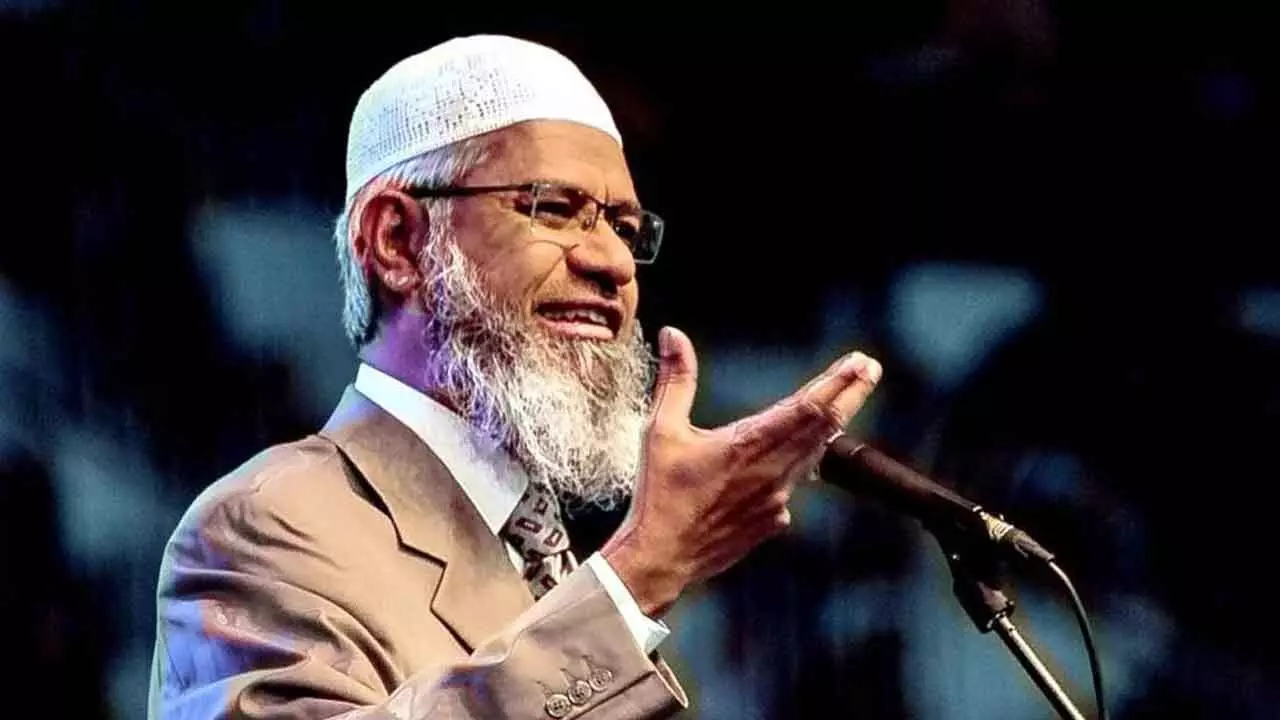Live
- Child marriage will be eradicated by 2026: Assam CM
- PMK President Anbumani Ramadoss urges TN government to act against online gambling
- From defence to culture and sports, India and Kuwait sign key agreements during PM Modi's visit
- Mahakumbh 2025: 110 mist blower machines and 107 fogging units to keep Akharas insect-free
- Piyush Goyal participates in Mahila Shakti Shivir event, calls Bima Sakhi Yojana 'a revolutionary initiative'
- Death toll from Cyclone Chido in Mozambique rises to 94
- 13 criminals from two gangs arrested in Jharkhand's Ramgarh for extortion
- Union Minister Bandi Sanjay Visits Injured Boy Sritej at KIMS Hospital
- Construction of over 1,000 bridges underway in Assam: CM Sarma
- Telangana IAS Officers wives association meets president Droupadi Murmu
Just In
The Zakir Naik Fiasco: State guest preaches misogyny in Pakistan

Zakir Naik, a controversial Islamic preacher known for his polarising sermons, is currently on a month-long visit to Pakistan as a state guest, having...
Zakir Naik, a controversial Islamic preacher known for his polarising sermons, is currently on a month-long visit to Pakistan as a state guest, having commenced his trip on September 30 and scheduled to conclude on October 28. His itinerary includes delivering public lectures across various cities and engaging with senior government officials.
Prior to his arrival, the visit faced scrutiny and condemnation, particularly from the Indian government, which has long sought Naik's extradition from Malaysia due to allegations of money laundering, hate speech, and inciting religious extremism.
Since becoming a fugitive in 2016 -- following the Dhaka terror attack where one assailant cited Naik's influence -- he has been associated with the now-banned Islamic Research Foundation and the controversial television channel Peace TV, which has been prohibited in several countries including India, Bangladesh, Sri Lanka, Canada, and the UK.
Naik's presence in Pakistan has already sparked significant backlash from the public as he continues to make contentious statements, prompting one Pakistani journalist to label him "India’s worst export".
The implications of his visit raise critical questions about the socio-political landscape in both Pakistan and India, particularly regarding the potential for heightened sectarian tensions and the impact of Naik's rhetoric on local communities.
As his visit unfolds, it is essential to monitor the reactions it provokes within Pakistan and its ramifications for India-Pakistan relations.
Zakir Naik's recent actions have sparked significant controversy and criticism, particularly regarding his expressions of religious conservatism.
At an event organised by an institute for orphans, he controversially declined to present shields to orphan girls, justifying this by asserting that they were of marriageable age and thus 'na-mahram' for him, which prohibited any physical contact; in contrast, he willingly presented shields to the boys present.
This incident elicited considerable public outrage, which was compounded shortly thereafter when Naik engaged in a contentious exchange with a Pashtun girl at a public gathering in Karachi.
She posed a pertinent inquiry regarding the prevalence of social issues such as drug addiction and paedophilia in her region, despite adherence to Islamic social codes, and questioned the silence of religious clerics on these matters.
Naik's response was defensive and dismissive, attacking the girl for implying that her society could embody Islamic values while simultaneously grappling with such issues.
Furthermore, a viral video captured him asserting that unmarried women cannot be respected and presenting two options for them: to marry a man who already has a wife or to become 'bazaari aurat' --public property.
In a subsequent interview with a female news anchor, he provocatively claimed that if a man could watch a woman newsreader for 30 minutes without feeling any attraction, he should seek medical attention, as this would indicate an underlying issue. These statements underscore the ongoing tensions between conservative interpretations of religious doctrine and contemporary perspectives on gender equality and women's rights.
Zakir Naik's recent remarks have provoked considerable backlash from the general public, as evidenced by a wave of critical social media posts, and have even drawn the attention of Pakistani celebrities, who typically remain silent on such issues.
This reaction is particularly striking given that Naik is in Pakistan as a state guest, having been praised by Pakistani Prime Minister Shahbaz Sharif for his role in "propagating the real image of Islam globally".
Prominent Pakistani celebrities such as singer Ali Zafar and television personalities like Bilal Qureshi, Shafaat Ali, Absa Komal, and Mishi Khan have publicly expressed their disapproval of Naik's misogynistic comments.
Additionally, Naik has faced controversy for disparaging Pakistan International Airlines (PIA) after they refused to waive charges for 500-600 kg of excess luggage, despite his status as a state guest; he claimed that in India, even non-Muslims would offer him free extra luggage.
His comments were met with widespread criticism, branding him as 'entitled' and prompting calls for him to go back.
Ultimately, this backlash compelled Naik to issue an apology for his statements regarding PIA, acknowledging the discomfort they caused and emphasising his desire to promote peace between India and Pakistan.
Zakir Naik is known for his vocal support for global jihad and his reluctance to label Osama Bin Laden as a terrorist.
During his visit to Pakistan, he notably met with members of Pakistani terrorist group Lashkar-e-Taiba, including Muzammil Iqbal Hashmi, Muhammad Harris Dar, and Faisal Nadeem, all of whom are designated international terrorists.
The Pakistani establishment's decision to invite Zakir Naik as state guest has raised pertinent questions about its intentions.
Public sentiment in Pakistan clearly opposes the invitation extended to Zakir Naik as a state guest, complete with ceremonial treatment and extensive security. This situation prompts one to consider what objectives the Pakistani government aims to achieve through such controversial gestures.
Given the current economic crisis and the growing disparities that fuel socio-ethnic tensions inside Pakistan, the decision to host a figure as provocatively radical as Naik suggests questionable priorities on the part of Pakistani authorities.

© 2024 Hyderabad Media House Limited/The Hans India. All rights reserved. Powered by hocalwire.com






